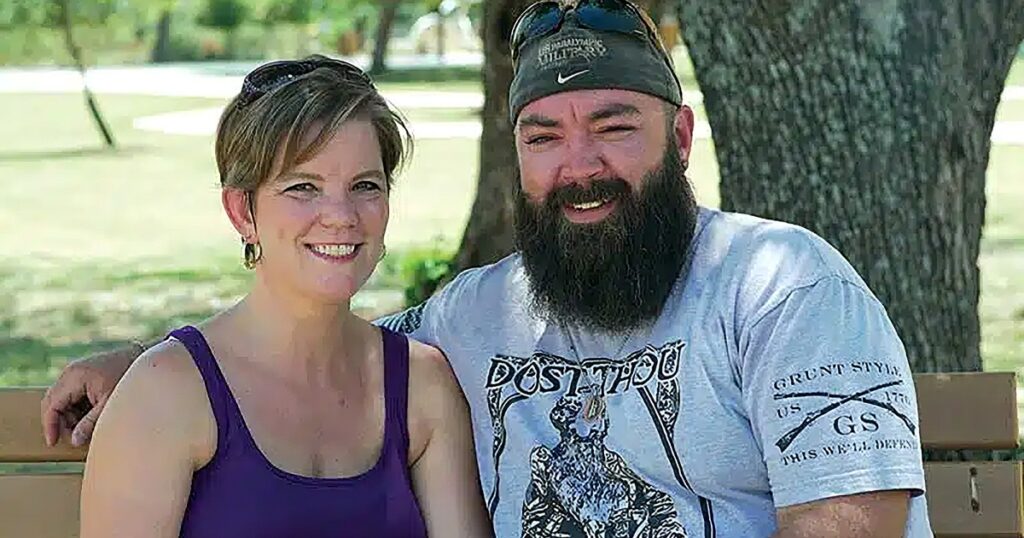In 2005, Tony Doyle was injured while serving in the U.S. Army in Iraq. As a result of his injuries, he lost his left leg below the knee and had to retire from the military. At that time, his income dropped by half, leaving his family without the means to pay all of their bills, said Melissa Doyle, his wife.
The family scraped by, racking up debt on credit cards to buy groceries and pay bills, such as electricity, while Tony’s paycheck covered the mortgage and car note. During that time living in Arkansas, Melissa couldn’t work full-time while caregiving for Tony, his two children and her child.
The Doyles ended up moving to Texas, where Tony could receive the proper therapy for his leg.
“The bills just piled,” Melissa said. And so did the family’s debt.
In 2017, the Doyles caught a break, receiving a home through Home for Our Troops, a non-profit organization that builds mortgage-free, adapted homes for severely injured veterans. Home for Our Troops also requires veterans to participate in a financial planning program with a pro bono financial planner for three years. The organization aims to ensure veteran families can budget and save money to cover expenses such as homeowners’ insurance and property maintenance.
The Doyles were connected with Susan Williams, a CFP professional who volunteered to help. Melissa, who had a background in accounting, developed a five-year plan before meeting with the advisor, and Williams helped them put that plan into action. It involved paying down their credit card debt, budgeting themselves to zero, and setting aside money for emergencies.
“When you have a traumatic injury that hits you in the face, you tend to lose everything that you’ve learned, and you’re struggling to pay the bills to be able to put food on the table and take care of the kids and take care of the husband, going through multiple surgeries and stuff like that,” Melissa said.
But with Williams, there was no judgment.
“When you open yourself up and you expose yourself, you’re very vulnerable and you’re open to judgment. And that’s hard for us in the military world,” Melissa said. “So when I presented it to her, it was very eye-opening to see that she was excited about what we had done, and she was very empathetic. We had the conversations of, ‘Yes, you have a mess, you have a bunch of debt, but it’s not the end of the world. You’ve done a great job building out this five-year plan, and you can continue on. There’s going to be a setback, and there’s going to be stuff that comes up. It doesn’t mean that you fail when you can’t stick to the plan precisely every month. You just reorganize.’”
CFP professional Susan Williams helped the Doyles put their five-year plan into action and get them out of debt.
Melissa said her family is in a much better place financially. Their debt from the early years of his retirement is gone, and their savings have increased. Additionally, Tony has been working for the last couple of years, so their income has increased significantly.
“What [pro bono planners are] doing is providing a tremendous amount of support for us that helps us rebuild our lives,” she said.
The Doyles’ story illustrates the broader trend of how veterans are uniquely vulnerable to financial struggles, yet underserved by the financial planning community.
The Broader Problem
A 2024 Survey of Household Economics and Decisionmaking found that veterans were more likely than other Americans to spend money on the lottery and gambling, pay overdraft fees on bank accounts and take out payday or pawn shop loans. Over one-third (35%) of veterans reported credit card debt, “significantly higher than non-veterans.” In addition, a 2023 study by Wiley found that suicide risk is increased among veterans with financial problems.
One obstacle to receiving financial advice is the median base pay for a new military recruit, which is approximately $28,000 per year in 2025. It is insufficient to afford the typical setup with a CFP professional, according to Jon Dauphine, CEO of the Foundation for Financial Planning.
“If you look at a lot of service members, many of them never really got much in the way of financial education,” Dauphine said. “Often they’re used to the military covering expenses like housing and food and healthcare, and then suddenly they return to civilian life and they have to do all of that. And it can be sort of a steep learning curve.”
Moreover, military professionals and veterans can also be targets for predation, such as payday lenders often setting up shop right outside of military bases.
The Consumer Financial Protection Bureau has a mandate to protect the financial well-being of servicemembers and veterans. According to a February 2025 brief from the National Consumer Law Center, the CFPB has filed 42 enforcement actions related to the protection of veterans and servicemembers, including pursuing predatory lenders, reining in data brokers and banning companies that harm veterans.
The CFPB still exists, although its operations were scaled back earlier this year, with regulatory and enforcement activities significantly reduced under the Trump administration. The One Big Beautiful Bill Act, signed into law in July, cut the agency’s funding to 6.5% of the Federal Reserve’s operating expenses, and the future of the organization is uncertain.
The FFP, which aims to expand access to pro bono planning, has had a strong commitment to veterans and military families since its early years. The organization has served about 350 veterans and their families thus far, and it has about 100 CFP professionals as volunteers working with this community.
The non-profit organization collaborates with several philanthropic partners nationwide and has awarded grants totaling several million dollars to military and veteran-related groups over time. Next year, FFP will fund a new group, Code of Support, which will be adding pro bono financial planning as a new component.
The Coordinated Assistance Network is another such partner, and FFP has provided $120,000 it in funding since 2023.
Steve Stout, the director of education at CAN, said the organization provides financial education, financial coaching and financial counseling to military personnel, veterans, caregivers and family members of veterans.
“Financial problems not only affect the veteran themselves; they affect the whole family as far as that goes,” Stout said. “And a lot of the difficulties they deal with top down have to do with basically paying a mortgage, paying utilities, paying car payments, and dealing with everyday finances and the struggles they have from coming out of the military and having to deal with things like post-traumatic stress, traumatic brain injury, or any type of service-connected disability that they have.”
There’s often a gap between what the veteran was making in active duty and what they’re making now.
“A lot of that falls over to the caregiver or the spouse, whereas the spouse might not have been working while the husband or the wife was in the military,” he said. “Now all of a sudden they’re having to take care of the veteran and deal with the financial aspect of it, earn an income to make up the difference and try to manage everything in the meantime, which can be a tremendous hit to them.”
The current economic environment, with elevated interest rates and inflation hovering around 3.0%, is putting many veterans in financial hardship, he said.
“You’re on a fixed income. Anytime inflation goes up, anytime the prices go up, that makes it harder for you to survive because you just don’t have the money to purchase the things that work on another part-time job or increase your income. So that’s impacting the veteran community quite a bit,” he said.
While VA benefits have continued during the government shutdown, those in active duty are not getting paid during this time. They’ll receive back pay, but they still have bills to pay. As it drags on, serious issues with delinquencies may emerge.
CAN will first provide basic financial coaching to veterans and discuss their needs before referring them to a financial planner. That way it’s a “warm handoff,” Stout said.
The organization receives thousands of requests for financial coaching and works with some 90 CFPs.
“This is a way to give back to that community, and it’s a way to help them get in a better position financially to where one day they can start investing, they can start planning for retirement, they can start developing their budget and everything else,” he said.
Veterans Helping Veterans
Dauphine said there’s a strong desire from veterans who have become financial advisors themselves to give back to this community.
Take Pete Bosse, a 40-year Army veteran who has completed more than 20 engagements in budgeting, debt consolidation and business planning through his volunteer work with CAN. He retired in 2020 as a Major General and got his CFP credential about three years ago.
Bosse has endured his own share of adversity, something he said helps him better relate to veterans and military personnel. For instance, he spent a significant amount of time investing in the stock market leading up to the 2008 financial crisis, which hit him particularly hard, resulting in a personal loss of $2 million. He spent the next 15 years rebuilding his retirement savings.
Home for our Troops volunteer Dick Power approaches working with pro bono clients the same way as his paying ones.
The pro bono work has been very rewarding, he said. He recently helped one woman create a budget to eliminate her credit card debt. She started with about $10,000 in debt six months ago; she just recently texted Bosse to tell him she had just paid off her remaining balance.
Dick Power, an Army veteran, has been an active volunteer with Homes for Our Troops, the organization that helped the Doyles, for many years.
Power said that most veterans come out of the military, find work and live a relatively normal life. But for the ones that don’t because of physical or mental injury, it can be a real struggle to get a job, let alone keep one. A lot of them come back with post-traumatic stress disorder or ADHD, and they have difficulties focusing on their financial situations.
In many cases, they hope that the military experience prepares them for a civilian job, but there is often no direct translation, he said.
“Sometimes employers don’t appreciate that military members come from an environment where they are disciplined,” he said. “They show up on time, and they work hard on their job.”
And they don’t teach how to find a job in the military.
Powers’ approach is to do the same thing for his pro bono clients that he does for his regular, paying clients. Pro bono work is a common practice among many professions, providing support to the general population. Financial planning should be no different.

